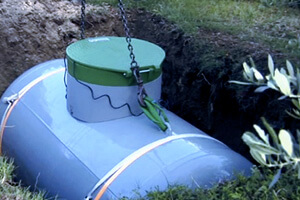Setting Up Propane Gas for a Home in France

Wondering if buying that old cottage heated with propane gas in the French countryside is a good idea? Selectra answers all your propane-related questions!
What are the Options for Gas Supply in France?
Depending on where you live, you may have one of two options (or both) for your gas supply.
- Mains supply (gaz de ville): natural gas delivered by GrDF and supplied by Engie (ex. GDF Suez), Total Direct Energie, eni, and others
- Liquified petroleum gas (gaz de pétrole liquéfié): stored in bottles or tanks, can refer to both propane and butane
Homes with natural gas supply in cities and towns will most likely be already connected to mains supply (you can find out more about these in our guide to natural gas supply in France). If you are not yet connected to mains gas, you may be able to ask GrDF for a connection (note that this will require some investment on your part). If a connection to a mains gas supply is not available, your next option is LPG - either propane or butane.
How to choose between propane and butane?
Both propane and butane can be used for similar purposes, such as for stoves, ovens, heaters, etc. However, differences in freezing and evaporation temperatures mean that butane must be stored indoors, whereas propane must be stored outside. French legislation makes it illegal to store propane indoors, which is why butane can only be sold in bottles and why gas tanks only contain propane in France. As prices and propane suppliers are basically the same for both fuels, your choice between propane or butane largely depends on where you are planning to store it (inside or outside).
Propane and butane can be used with most devices (cookers, etc), and the fittings on cookers are usually the same (though would have to be changed if switching to mains gas). However, the regulators are different (as the size of the bottle is usually different for propane and butane).
Where to Purchase Bottled Gas in France?
You can find bottled propane gas in most large supermarkets, petrol stations, or at designated kiosks. Keep in mind that when you buy a bottle of gas, you are paying for the gas inside the bottle (butane or propane) and not the bottle itself, (you will have to pay a deposit - consigne - on the initial purchase). This means that you will have to purchase gas from the same supplier when you return your empty bottle. Make sure to check which suppliers are most widely available in your area, as not all outlets sell bottles from all of the suppliers.
To compare the price of gas bottles, you have to compare prices between different bottles/suppliers along with other elements (weight, ergonomics, etc), as well as prices across different points of sale. Indeed, you may find that different retailers charge different prices for the same gas bottle.
How much does bottled gas cost in France?
As of October 2018, the deposit for a bottle of butane gas ranged from 1€ to 50€, depending on the supplier and the size of the bottle. Propane refills ranged 17.90€ to 96.90€. For propane bottles, prices ranged from 1€ to 50€ for the initial deposit, and refills ranged from 9€ to 89,90€, depending on the size of the bottle and the supplier.
Find a full price comparison here (in French)
Why Use Propane Gas in France?
Do you want to connect your accommodation to the natural gas distribution grid? Call our English-speaking advisors at 09 87 67 37 93 or get a free callback (Monday - Friday 8 am-9 pm; Sat 9 am-6 pm).
Propane is generally more popular than butane in France since it can be stored outside in greater quantities in a tank. Although natural gas is less expensive, propane gas is a good alternative for accommodations that cannot be connected to the natural gas distribution system (which is sometimes the case in rural areas in France). The price of propane gas is comparable to the price of electricity. Propane can be used for cooking, hot water, and surface heating, as well as for patio heaters and barbecues.
Good to knowPrices are negotiable with suppliers, and you may be offered discounts on your installation.
Propane Suppliers in France
There are 4 main propane suppliers operating in France: Antargaz, Butagaz, Primagaz and Vitogaz. These suppliers represent 90% of the existing market for propane in France.
| Supplier | Description |
|---|---|
 | Antargaz has competitive pricing compared to other LPG suppliers in France. The company is well established in France and consumer reviews on its Antargaz customer service are generally positive. |
 | Butagaz is a major player in the field of gas cylinders and propane, well distributed in France. The company offers a variety of propane tank supply offers to appeal to all types of consumption profiles. |
 | Primagaz is developing its gas cylinders marketing activity with the resumption of Actigaz company's activities in 2013. |
 | Vitogaz is present on the gas bottle and propane tank markets. The company makes pricing information available on its website. |
The Price of Propane Gas in France
The price scales propane gas suppliers display do not take into consideration the possible discounts that are often offered to clients when they subscribe. In 2014, the French Competition Authority revealed that the price directly proposed to clients always contained at least a temporary discount (around 30% but sometimes even up to 50%) by comparison to advertised prices.
Price of a tonne of propane gas for an underground tank of 1100 kg capacity and an annual consumption of 1240 kg with automatic delivery in metropolitan France (excluding Corsica), excluding subscription and additional fees. These figures were taken from providers' websites in 2019.
To compare prices, request an estimate for propane gas (in French), call our English-speaking customer service line at 09 87 67 37 93 or get a free callback (Monday to Friday).
FAQ
Can I own my propane gas tank?
You have three options for the ownership of your propane gas tank in France:
- You rent the gas tank: you pay a monthly subscription to your supplier, which usually includes maintenance fees. This is a turnkey solution; you don't have to worry about the tank or its maintenance. However, you are bound to exclusive supply from the company that owns the tank.
- Your supplier provides you with a gas tank: you will be asked to pay a deposit, which will be returned to you when you end the contract. You will also be charged maintenance fees for the tank, and the company that owns the tank has the exclusive right to provide your propane supply. However, your bill is decreased because you will not have renting fees.
- You own the gas tank: though suppliers rarely advertise this option, you can buy your supplier’s gas tank during your engagement or at the end of your contract. This option releases you from being bound to a single provider for your propane supply. Keep in mind that initial investment is quite high (around €1400), and you will be responsible for maintenance costs.
What type of propane gas tank should I choose?
There are two installation options forpropane gas tanks:

Setting up an underground propane tank
- Underground tank: this is a more aesthetic, albeit, costly option. Installation of an underground tank takes longer to get set up (up to four hours instead of two for an overground tank), but service lifespan is the same (30 years on average).
- Overground tank: this is the cheaper installation option, and takes less time. Installation only takes a couple of hours, on all types of terrain. An overground gas tank has an average service lifespan of 30 years.
What other fees should I be aware of?
Tank Maintenance
Considering the dangerous nature of the product they contain, propane gas tanks must be well-maintained and checked regularly. If the propane company owns the tank they will be responsible for maintaining your propane tank, and maintenance fees will be included in your monthly subscription. However, maintenance fees can change, or may be subject to additional charges. Make sure to closely examine price lists you receive from prospective suppliers to better anticipate maintenance costs.
Delivery
There are two options for propane gas delivery:
- Automatic delivery, on your supplier’s initiative. They will calculate delivery frequency based on your consumption history and weather. This is usually the cheapest option, and is probably the safest (to be sure that you will never run out).
- Requested delivery, on your own initiative. It is a good idea to contact your supplier when your propane gas tank is at 20% capacity. You will be charged for each delivery.
Billing
Two billing methods are proposed by propane gas suppliers:
- Billing according to the amount of product delivered. You are charged for the amount of propane gas you have been delivered. This situation is appropriate for a customer-initiated delivery.
- Billing according to consumption. Your supplier may install a meter, in order to track your consumption. Typically you will charged a fixed monthly fee for 10 months, with the last two months of a year allowing for account regularisation. This invoice system is appropriate for automatic deliveries.
| French Term | English Translation | French Term | English Translation |
|---|---|---|---|
| Propane | Propane | Butane | Butane |
| Gaz de ville | Mains gas supply | Consigne | Deposit |
| Bouteille | Bottle | Citerne | Tank |
| Cuisson | Cooking | Chauffage | Heating |
| Eau chaude | Hot water | Entretien | Maintenance |
